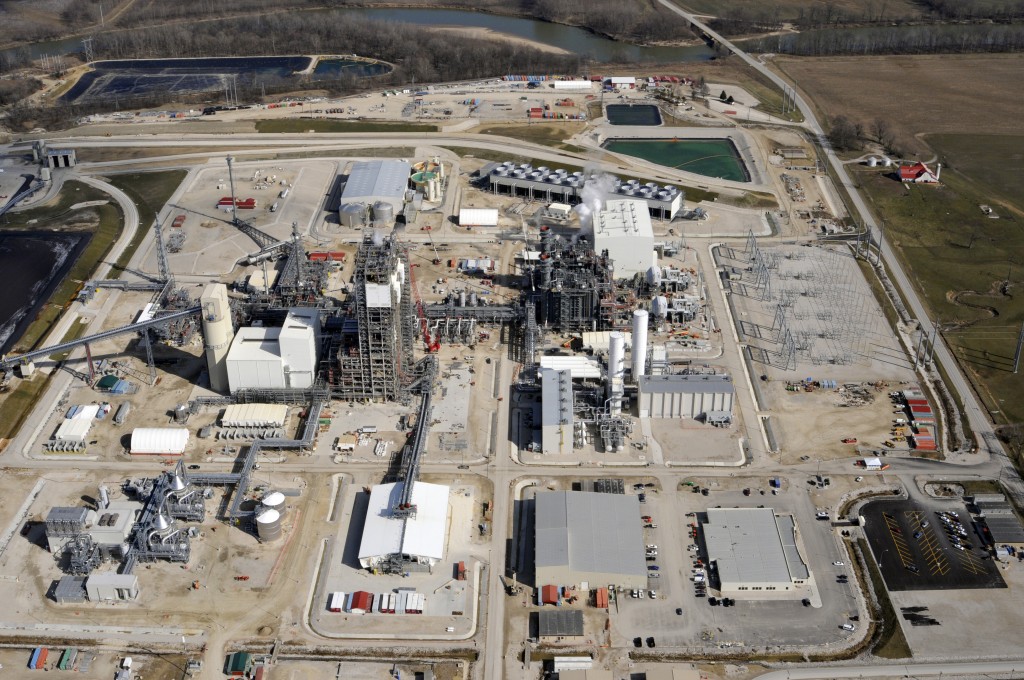March 6, 2012-by John Russell in the Indianapolis Star

Duke's Edwardsport new coal plant has been fraught with problems due to inept management of the construction. However, it has managed to finish the project although at nearly three times the original estimate Duke presented Hoosier politicians in 2004 when they said its would cost $1.2 billion and include carbon capture and sequestration. Had they included that the project would have ended up costing Duke's Indiana ratepayers a whopping $4.5 billion. Duke has fought to keep much of the information about the plant from the public eye and a hearing was held today in Indianapolis on whether to make many of those documents public. The indiana Utility Regulatory Commission has given Duke just about everything they have asked for to date, even as scandal has surrounded the overly friendly connection between Duke and the IURC. Valley Watch has been an intervener and opponent of the construction of the facility since its inception. Photo © 2012 John Blair.
What critics call one of the most controversial and cloaked cases ever heard by an Indiana regulatory agency might soon get a little more sunlight.
On Tuesday, the Indiana Utility Regulatory Commission will consider whether to unseal hundreds of additional documents in the massive investigation into possible wrongdoing at Duke Energy Corp.’s $3.3 billion power plant in Edwardsport.
Depending on its decision, the agency could give a fuller picture of the engineering and construction problems at the plant, as well as the huge cost overruns that could push up monthly bills for hundreds of thousands of Indiana customers.
• MORE COVERAGE: Blog: Prying open the Duke Energy scandal.
Such a move also could shed light on whether the giant utility hid vital information from regulators, one of the major allegations lodged against Duke.
For years, key aspects of the Edwardsport project have been shrouded in secrecy. The engineering plans and inspection reports have been under tight wraps at the IURC, kept away from the public by state laws designed to protect company trade secrets.
On a larger scale, the working relationship between Duke and Indiana regulators also has been a tightly guarded secret. Despite laws meant to keep the process mostly open to the public, the two sides for years operated behind the scenes, holding secret meetings and trading private emails with sensitive information.
Much of that activity was exposed by The Indianapolis Star over the past 18 months, resulting in the indictment of former IURC Chairman David Lott Hardy, firings, resignations, an FBI investigation, an ethics reprimand and growing public scrutiny.
But the issue of secrecy continues to dog the project.
For three months, the IURC has heard testimony about allegations that Duke committed fraud, hid information and mismanaged the project. It also looked at broader questions of whether Indiana needs the additional electricity that would be generated by the plant — and the reasonableness of continuing with the project.
A large portion of the hearing, however, took place in a closed hearing room. Hundreds of exhibits were submitted under seal of confidentiality or with severe redactions. All lawyers and many of the parties were required to sign lengthy confidentiality agreements.
Duke says it has been as transparent as possible, given its obligations to protect its trade secrets and those of its businesspartners.
Now the question is whether the secrecy will diminish.
In a 98-page spreadsheet recently filed with the IURC, Duke is petitioning to keep more than 400 exhibits confidential. Those include internal emails, memos, letters, forecasts, reviews and reports on the Edwardsport project.
Duke says many of the confidential exhibits contain pricing information, operational details and other trade secrets. Opening them to the public could harm Duke’s competitive position and its business relationships, the utility has said.
The “proprietary information needs to be protected from public disclosure,” Duke Vice President Michael Womack said in a filing with the IURC.
Duke said it already has turned over more than 200,000 pages of documents to the other parties, including the Office of Utility Consumer Counselor, major industrial customers and Citizens Action Coalition. Go to the Original
